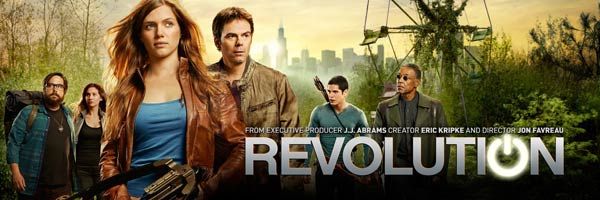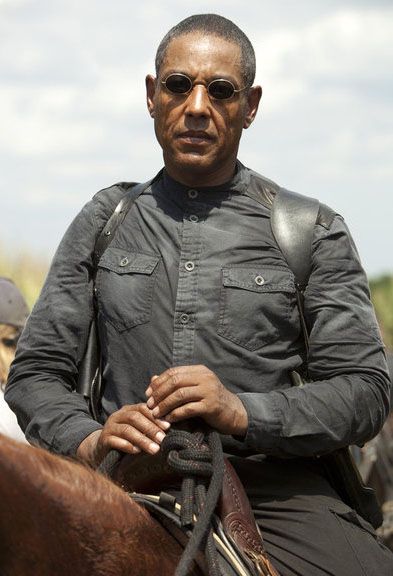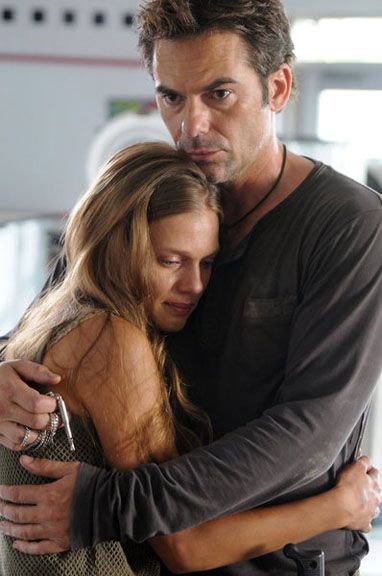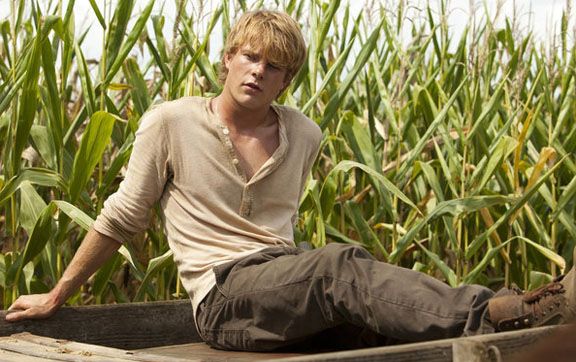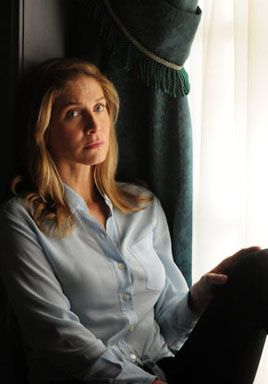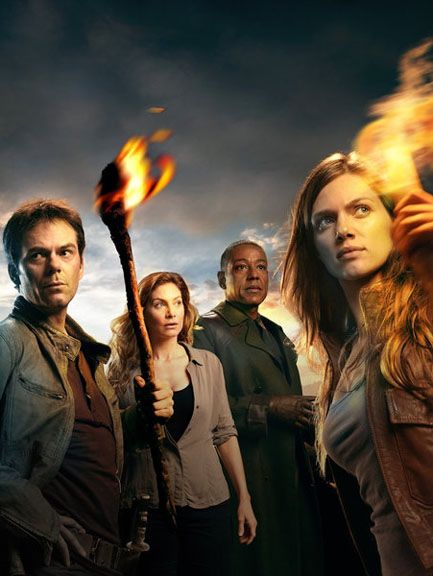The NBC drama series Revolution tells the story of a family that struggles to reunite in an American landscape where every single piece of technology — computers, planes, cars, phones and even lights — has mysteriously blacked out forever. The show is centered around one strong-willed young woman, Charlie Matheson (Tracy Spiridakos), whose brother is kidnapped by militia leaders, forcing her to reconnect with her estranged uncle Miles (Billy Burke), in order to rescue Danny (Graham Rogers), overthrow the militia and ultimately re-establish the United States of America, all while they explore the enduring mystery of why the power failed and if it will ever return.
During this recent interview to update where things are headed with the show, creator/writer/executive producer Eric Kripke (Supernatural) talked about why the blackout happened the way it did, explaining the cause of the blackout before the end of Season 1, revealing the backstory for Captain Tom Neville (Giancarlo Esposito), how long the quest to find Danny will last, how hard things will get for Charlie, learning more about the motivations of both Miles and Rachel (Elizabeth Mitchell), and how likely something like this is to happen, in the real world. Check out what he had to say after the jump, and be aware that there are some spoilers.
Question: What are viewers going to learn about Captain Tom Neville (Giancarlo Esposito), in terms of his backstory and who he was before?
ERIC KRIPKE: What’s interesting about the blackout and what we want to explore more, as the show goes on, is what a transformative experience it was for so many people. Who they were in the old world has nothing to do with who they are now, and there was a bit of that in the pilot. We were always amused by the idea that he’s this violent, strong man post-blackout, but pre-blackout he was an insurance adjuster. So, we were really interested in exploring that backstory more and seeing how his character who, before the blackout was pretty mild-mannered and maybe a little submissive, transformed into the violent psychopath that he is today. We’re going to meet Kim Raver’s character in the present day and really explore her character, a couple episodes down the line. We’re going to see how a very normal suburban wife before the blackout, transformed into a Lady Macbeth post-blackout.
What was it about Giancarlo Esposito that led you to cast him for the role of Neville?
KRIPKE: Well, Giancarlo is just a world-class actor and, frankly, we were shocked that he was willing to partner up with us because we felt like, “Why would such a classy actor want to hang out with such shady people?” I was a huge fan of his performance in Breaking Bad, but I’ve been a fan of his, from long before that. We’re just honored to have him be a part of the show. He brings so much depth and emotion to Neville. Neville has got moments of vulnerability and humanity. He’s just a really interesting, complicated character that Giancarlo makes so much better than what is on the page. He’s exactly the type of actor you want to work with because you can write any dialogue and he makes it about five times better than it actually is. I’m just honored to be working with him. And then, on top of that, the government actually has designated him to be the nicest man in America. He couldn’t be a sweeter, more gracious, more open-hearted and collaborative guy. He is that talented and that kind-hearted, and is really just is really one in a million. I love working with him.
What made you decide to downgrade Maggie (Anna Lise Phillips) from a series regular, and then eventually write her out?
KRIPKE: You know, what it really came down to, more than any other decision, because Anna Lise is a wonderful actress and I love that character, is that I have a bad habit, in the shows that I run, of killing off the people that I love, and I think Maggie was one of those [examples]. I think we decided, internally, very early on, that it was really important to show that this world had very real stakes, and that it was truly dangerous. And, because you’re not close to hospitals or paramedics, we very quickly realized that the scariest thing we could do was to kill the doctor among them. So, it was purely a creative decision about really giving the world the real charge of danger, so that, as we move forward in the series, audience really understands that nobody is safe, including the main characters. We just wanted to bring that suspense, as the series continues, because we think that’s honest to the world we’re trying to create here.
When the blackout happened, it looks like it was very gradual over the whole Earth. Are there clues as to the origin of the blackout, or did it just look cool to have that sweep of darkness over the Earth?
KRIPKE: You should look for clues everywhere, is the short answer. The longer answer is that there was a phenomenon that we have up our sleeve, as to what caused the blackout. What you saw in that globe shot is an accurate representation of what we are working on, but we’re currently in the writers’ room. We’re talking dangerously about revealing that secret before the end of the first season. It’s my philosophy of not being too precious with anything, so we may reveal the secret of what caused the lights to go out, sooner rather than later.
So, you want to reveal that information by the Season 1 finale?
KRIPKE: You know, we’re still working on that, so I don’t really have that answer for you. I just know that, for me, the longer you drag out an answer, the more pressure there is that that answer is the greatest answer ever given, in the history of man, and frankly, I’m just not that smart. So, I would prefer we answer questions quickly, and then ask more questions, and then open a door to a whole other, bigger room. We’ve designed a mythology that, even if I do answer the question about what caused the blackout, it leads directly to a bigger and scarier mystery. It’s about keeping the mythology moving at a good pace, and not dragging anything out too much.
Did the full season pick-up mean that you were able to go ahead with some story ideas and arcs that you’d maybe put on the backburner, in case NBC cut the episodes short?
KRIPKE: Well, television showrunners are a foolishly optimistic bunch. I think we were designing our storylines, in the hopes that there would be a full season pick-up. I designed the storyline for 22 episodes, and then in my back pocket I had a nuclear failsafe for if it looked like everything was going off the cliff. I had an emergency contingency plan to wrap everything up, very quickly. But, obviously, I’m very thankful to the network that they gave us the opportunity to tell the story.
Will Grace (Maria Howell) be coming back?
KRIPKE: Yeah. I can’t reveal too much because she’s right in the dead center of where the mythology is, but I will say that we continue to explore and expand on that mythology and we do see her again. I think the next time we see her is in Episode 7, so not too far away. And we see who this person who kidnapped her in Episode 2 is, and we get to learn more about him. We start to expand it because she is under duress and she’s in a dangerous position right now, and we start to tease that out. Right now, we’re really dropping bread crumbs for it because, in the second half of the season, their storyline really begins to play a huge part in the main storyline of the show.
How long can you keep the quest for Danny (Graham Rogers) going before you really need to shake things up?
KRIPKE: We can keep that quest going until Episode 10, and then we do shake things up. That is absolutely my MO of show writing. They catch up to Danny in Episode 10, and we climax that story, because you can’t keep that story going forever. We never had any intention of keeping the search for Danny going forever. It was only a way to bring the audience into the world and introduce them to the characters with a nice, clean, simple storyline, as the prologue to a much bigger story. I would say that, by Episode 10, we will have played that prologue out, and it’s time to begin the next chapter of the show and time to explore much more of why the show is in fact titled Revolution.
How hard will it be for Charlie (Tracy Spiridakos), going forward, in terms of not only finding Danny, but for her own survival?
KRIPKE: You know, that’s the big character challenge for her. She starts out as a very hopeful, very optimistic, even naïve character. There’s a very classic archetype that Charlie fits into, from Luke Skywalker to Dorothy Gale to Frodo, and this idea of the innocent being thrown out into the big bad world. For Charlie, the question is, “Can she become more experienced, tougher and stronger without losing hope and without losing her soul?” When she’s exposed to that larger world that’s a big threat, we play with how much duress and hardship she can face before she loses what’s truly special about her, which is this belief in mankind and this belief that things can get better. If she doesn’t have that, then she’s lost and, in a way, we’re all lost. So, that becomes one of her central character conflicts, as the series proceeds.
Viewers have already learned so much about Miles (Billy Burke) and his background with the militia, and now Rachel’s (Elizabeth Mitchell) disappearance. How long do you plan on keeping that information from the rest of the group?
KRIPKE: Well, the good news is that it’s been years. We found him, 15 years later. We’ve only revealed two or three episodes of what has happened in his colorful and mysterious past, but there’s an endless amount of material, in terms of what he’s done and what he’s been through. Within Season 1, we reveal what the storyline with Rachel was all about, not just to the audience, but to Charlie. I think will be pretty explosive for Charlie to hear. We will really start to flush out his relationship with General Monroe (David Lyons), in a very tragic, emotional, Cain & Abel way, and we really start to understand who those two men were and what Miles’ role was, in forming this militia, which is now the enemy of the heroes in the show. We’ll just keep exploring it because there’s a lot of material in his background that we can touch on and reveal.
What are Rachel’s motivations and the direction her character is going in?
KRIPKE: Certain ones are a little mysterious, so I have to be a little cagey because we will reveal some things. But, she’s obviously holding on to certain secrets about why the power went out, and we’ll reveal a little more about what she knows about the blackout. Monroe has been keeping her prisoner in a gilded cage, with occasional torture, so it’s not so fun, but she’s strong. We’re so smitten with what Elizabeth is doing with the character that we’re just writing more and more and more for her. She’s so good. But, everything changes when Danny finally arrives in Philadelphia. And so, now General Monroe will have Rachel where he wants her. She doesn’t really care about he own well-being, but of course, she cares about the well-being of her son. So, he’s really able to twist her arm and force her to reveal things that she hasn’t revealed to him yet. But, she is smart and heroic, and is desperately searching for a way out of the predicament that she’s in.
Are viewers going to see Nate (JD Pardo) and Charlie’s relationship develop more?
KRIPKE: The short answer is yes, but over the sweep of the season. He’s going to be spending some time in Philadelphia, and we’re going to start to understand what his world is like, within the world of the militia. But, he’s certainly going to interact with Charlie again. He has a bumpy road ahead for him.
How likely do you think it is that something like this could happen, in the real world?
KRIPKE: We did some research on electric magnetic storms and solar flares, which have the possibility to knock out the National Grid. What we found was that, because we’re entering a period of increased solar activity, there’s this insane statistic for the likelihood of a storm being generated that’s big enough to potentially do this, over the next 10 years, that’s like 10%. That’s not to say that it actually will do it, but they’re saying that the potential exists, which is terrifying. In terms of what it would create and the problems it would cause, they’re really substantial because there’s really a lot of fresh water that is piped into locations that you can’t actually get to. And it’s electric pumps that are keeping the majority of the sewage out of that fresh water.
So, there would be incredible water shortages and dysentery and disease, that would all begin immediately, if something like this were to really happen. Then, it’s about how the police or the government would maintain order without any sort of coordination or communication. There was a solar storm that caused the Grid to go out, somewhere in Canada. It knocked out their Grid for days and, by the last few days, they were having a difficult time maintaining social order. There were runs on grocery stores. There was looting. At the end of day, people are starving and, if people are starving and thirsty and they need to keep their families alive, people become desperate quickly. There are real world examples of this. all over the place. So, if this were to happen over a sustained period, where there wasn’t that type of communication, over weeks and months, I think maintaining social order would be very, very difficult.
Revolution airs on Monday nights on NBC.

